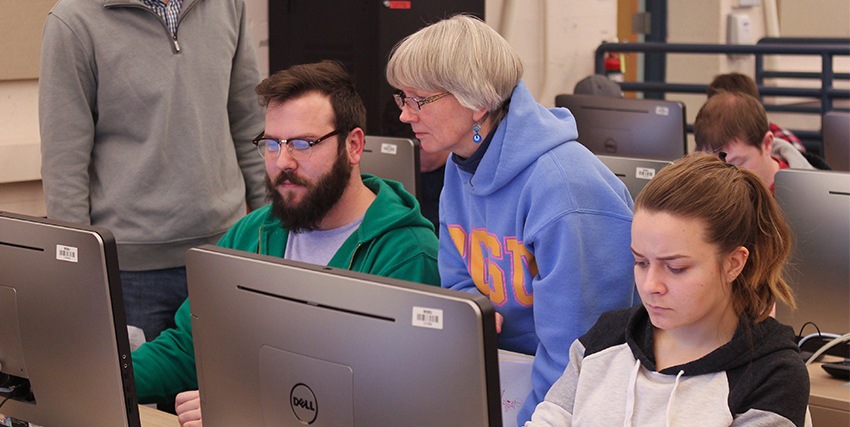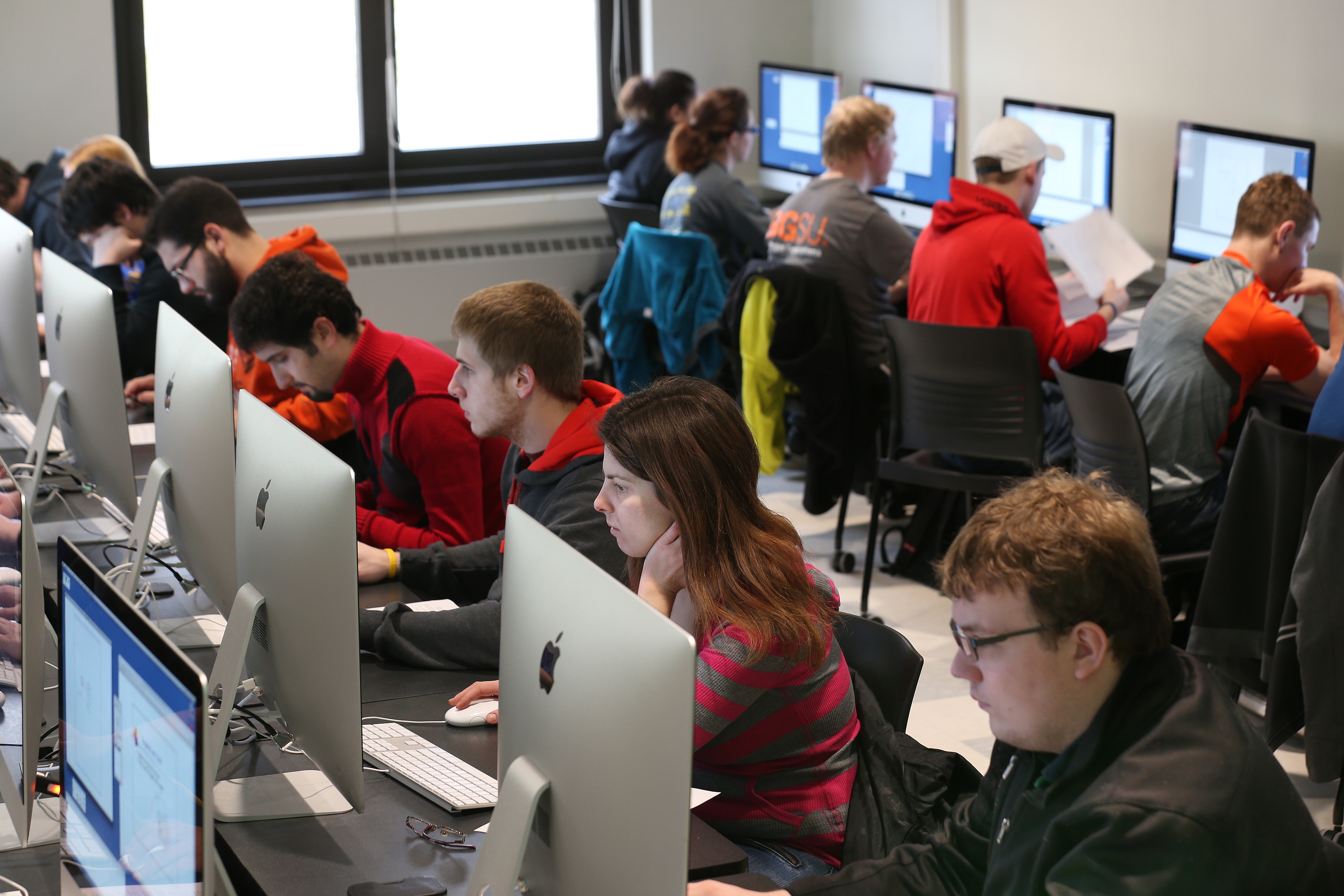Nationally recognized for student experience
The Wall Street Journal

Bachelor of Science (B.S.)
Software Engineering
In this fast-paced digital age, a software engineer degree from BGSU prepares you for in-demand software engineer jobs.
Our Bachelor of Science in Software Engineering (BSSE) equips you to create, maintain and improve computer programs and operating systems critical to business, government, nonprofits and the public. You will learn to design, develop, test and manage software applications in computer, mobile and embedded systems.
Software engineering is a branch of computer science drawing from engineering principles and programming knowledge to build software systems that are reliable, scalable, user-friendly and secure. Enterprising software engineer degree graduates become team members and trailblazers who have a hand in shaping the future of our digital landscapes.
Why study software engineering at BGSU in Ohio?
- High earning potential. Estimated software engineer salaries in Ohio are somewhere between $90,000 and $110,000, with the best-paid opportunities typically in specialties like software development.
- Wide open career possibilities. Nearly all industries and operations rely on software in some capacity. For some, it’s mission-critical. They count on professionals with a software engineering degree to develop and manage these systems.
- Learn from the best. All BGSU computer science major courses – including those in the software engineering degree program – are taught by highly-qualified professors (not graduate assistants). Faculty members ensure a strong, interactive and practical learning environment.
- Small class size. Student-teacher ratios are intentionally low. This allows for more individualized attention and support.
- Gain real-world experience. The BGSU Computer Science Department has strong connections with many major regional employers. Our students land competitive computer software engineering internships or co-ops through our cooperative education program and some of the best entry-level software developer jobs. Many do practical computer-related work as full- or part-time employees while they earn their degree.
- Classmate connections. The Computer Science Department proudly supports student chapters of the Association for Computing Machinery and the Association for Computing Machinery’s Council on Women in Computing. First-year students can also connect through the AIMS Learning Community for STEM majors living on campus.
- Elevate your potential. A Bachelor of Science in Software Engineering sets the stage for seamless transition into the BGSU Master of Science in Computer Science program with a specialization in software engineering.
Software engineer jobs in the U.S. are forecasted to expand by 25% over the next decade – much faster than the national average.
(Source: U.S. Bureau of Labor Statistics)
Admissions
Software engineering majors must meet one of the following admissions requirements:
- SAT math score of 550 or higher
- ACT math score of 22 or higher
Students who do not meet this criteria must complete the appropriate math course or earn the appropriate math placement score at BGSU before declaring a software engineering major. Since many high schools do not offer computer programming or computer science courses, incoming students aren’t expected to have this background.
#1 public university in Ohio for career prep
The Wall Street Journal
Career - what can you do with a degree in software engineering?
BGSU graduates with a software engineering degree are equipped with skills that are sought after, highly compensated and on the cutting edge of new technology development.
Software engineering is essential for a wide variety of devices and systems, spanning numerous industries and applications. A software engineering degree teaches students the systematic processes necessary to develop, analyze and deploy technology systems.
What do software engineers do on a daily basis? Much depends on the nature and size of their employer, but many have responsibilities such as:
- Designing and managing software systems
- Analyzing and testing software programs
- Writing and testing code
- Optimizing software systems for improved speed and scale
- Collaborating with clients, fellow engineers, specialists and other departments
- Clear communication of software functions and features to the less tech-savvy
Emerging career opportunities exist in many industries including:
Software is used in medical imaging, electronic health records, telemedicine platforms and patient management systems. Graduates may be hired as network security engineers or IoT (internet of things) platform developers or IoT engineers.
Secure software is needed for online banking, financial planning and fraud detection. Job titles can include cybersecurity engineer, bank software developer or financial software engineer.
E-learning platforms, school management systems, educational games – all those digital elements require software development and maintenance. Professional roles include application integration developer/engineer, information architect or full stack developer.
Precision is key with software used for traffic management, navigation, vehicle control and logistics planning. Transportation software engineers may be hired as infrastructure engineers, systems engineers and AI engineers.
Software keeps us all connected, with social media platforms, messaging systems, video conferencing tools and more. Possible jobs may include multimedia programmer, cloud engineer or reliability engineer.
Streaming services, video games, content creation apps – all depend on software engineering to operate smoothly (or at all). Potential titles include mobile app developer and gameplay programmer.
Whatever your interests, there’s a strong possibility you’ll find software engineering jobs that closely align. There’s often fluidity to move from one industry to another since software engineer skills are highly transferable.
Career paths
- AI developer/AI engineer
- Database administrator
- DevOps engineer
- Full-stack developer
- Mobile application or IoT developer
- IT security engineer
- Site reliability engineer
- Software system architect
- Software development manager
Quick Facts from the Bureau of Labor Statistics
99% of computer science graduates report they’re employed, in graduate school or starting a business within six months of graduation.
Curriculum
Students who succeed in the BGSU software engineering degree program tend to be detail-oriented and creative with strengths in analytical, problem-solving and communication skills.
Coursework for the BGSU undergraduate software engineering degree focuses on studying the methodologies, processes and tools necessary to design, develop and maintain software as part of a disciplinary team.
The curriculum incorporates a comprehensive blend of classroom knowledge and computer science and software engineering skills. It culminates in a software engineering team project (also known as a capstone project). This will cover two more areas of software engineering. This, combined with a software engineering internship/co-op experience, provides exposure to real-world projects and professional contacts.
BGSU software engineering graduates are expected to have the ability to:
- Identify, formulate and solve complex engineering problems by applying principles of engineering, science, and mathematics.
- Apply engineering design to produce solutions that meet specified needs with consideration of public health, safety and welfare, as well as global, cultural, social, environmental and economic factors.
- Communicate effectively with a range of audiences.
- Recognize ethical and professional responsibilities in engineering situations and make informed judgements, which must consider the impact of engineering solutions in global, economic, environmental and societal contexts.
- Function effectively on a team whose members together provide leadership, create a collaborative and inclusive environment, establish goals, plan tasks and meet objectives.
- Develop and conduct appropriate experimentation, analyze and interpret data, and use engineering judgment to draw conclusions.
- Acquire and apply new knowledge as needed, using appropriate learning strategies.

Sample courses
- Software Engineering
- Software Security
- Web Application Development
- Mobile Application Development
- Software Architecture and Design
- Software Testing and Quality Assurance
- Database Management Systems
- Software Engineering Capstone Project
#1 university in Ohio – big or small, public or private – students would choose again
The Wall Street Journal
The Software Engineering program is part of the Department of Computer Science in the BGSU College of Arts and Sciences.
Accreditation
The Bachelor of Science in Software Engineering program is accredited by the Engineering Accreditation Commission of ABET, https://abet.org. ABET is a nonprofit organization that accredits higher education programs in engineering and engineering technology, applied science and computing. It is recognized as the worldwide leader in quality assurance for programs in those disciplines.
Bowling Green State University [BGSU] is accredited by the Higher Learning Commission. BGSU has been accredited by the Higher Learning Commission since 01/01/1916. The most recent reaffirmation of accreditation was received in 2022-2023, with our next reaffirmation of accreditation scheduled for 2032-2033. Questions should be directed to the Office of Institutional Effectiveness.
Updated: 07/31/2025 09:38AM

